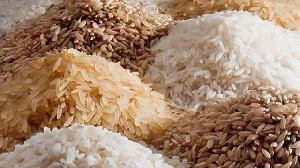The rising cost of fertiliser on the global market will negatively affect availability of rice and other staple foods in 2023 if the crisis between Russia and Ukraine continues into next year, a Chief Economist at the United Nations Food and Agriculture Organisation (FAO), Maximo Torero Cullen, has predicted.
Mr. Cullen, in an interview with the Finance and Development Journal – a quarterly bulletin by the International Monetary Fund (IMF), says wheat and fertiliser supply shortages have already driven-up prices and increased food import bills for most vulnerable countries by more than US$25billion this year; putting 1.7 billion people at risk of going hungry in the future.
“If the war continues in 2022 and 2023, we could potentially have a food access problem coupled with a food availability problem, because Ukraine and Russia will further reduce their exports, including fertiliser. This is a situation we have to avoid,” he cautioned.
Under the current conditions, Cullen said Ukraine could reduce its exports of wheat and maize by around 40 percent – and Russia might do similarly.
Equally, the FAO observed that rice production and availability will slump to its lowest from 2023 due to the increase in cost of fertiliser, as prices of the cereal are starting to rise.
This situation, according to the FAO, could deteriorate further as a poor monsoon season is potentially affecting rice planting in India.
“These developments pose risks because rice is a key staple around the world, including sub-Saharan Africa,” Cullen indicated.
The way forward
The FAO’s chief economist suggests that key exporters of rice be prioritised to access fertilizer, as they will supply the rice needed by the world to minimise food access problems in the next year and prevent a full-blown catastrophe.
Cullen’s analysis of the situation in Russia-Ukraine
The FAO has said the high natural gas prices and rising food prices could make the difference between life and death for millions of people around the world.
Cullen said though the FAO admitted the crisis in Russia and Ukraine is the main driver behind present food price problems, it maintains that most countries having a food crisis also have internal conflicts.
“The second is economic downturns: COVID-19 is one of the major reasons most poor countries are facing significant challenges. And the third, of course, is climate change,” he added.
Growing effects of the Russia-Ukraine crisis
The war has exacerbated the already-existing problem of a global food crisis, as it stopped exports from two key exporters of cereals.
Around 50 countries depend on these two exporters for at least 30 percent of their cereal imports. For about 20 of these countries, it is more than 50 percent.
Another factor is that Russia is the world’s leading exporter of nitrogen, as well as the second-largest exporter of potassium and third of phosphorus fertiliser.
So when it halted the export of fertiliser, prices shot up – and since they were already high before the war, this has created a significant problem for farmers.
So the impact on food-importing countries is two-fold: they face a steeper food import bill and higher cost of fertilizer – which has quadrupled and many farmers cannot afford it.
Impact on vulnerable economies
In the case of Africa, the key net food importers are northern African countries – more than 50 percent of their wheat imports come from Russia and Ukraine. However, sub-Saharan Africa is different as it does not have wheat as a main staple.
However, maize and wheat are used for livestock in sub-Saharan Africa, with rice as the main staple.
“In the 62 most vulnerable countries of the world, we are talking about a roughly US$25.4billion increase in the food import bill compared to last year. And this is affecting 1.7 billion people,” Cullen reiterated.
Source: thebftonline.com
 Home Of Ghana News Ghana News, Entertainment And More
Home Of Ghana News Ghana News, Entertainment And More





